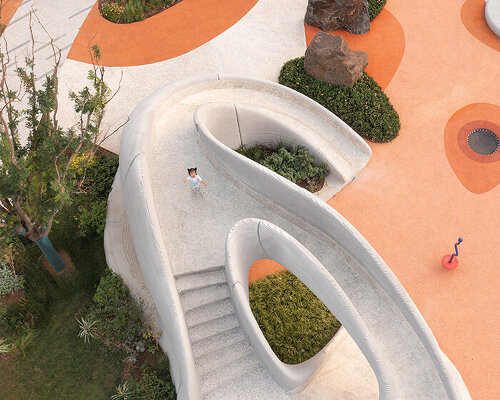xisui design shapes 3D printed concrete playground in china
In Jinan, eastern China, XISUI Design completes Boulder Park, a playground that spans 4,000 square meters and centers on the figure of the boulder as a recurring spatial motif. Scattered across the site, these forms function as play equipment and landscape elements. The most prominent structure is a cave-like installation with layered surfaces and free-form geometry that resemble weathered stone formations, made using large-scale 3D concrete printing.
The use of digital fabrication here is a way to test how emerging construction technologies might support low-rise and public-facing environments.
all images by Hu Yihao, Zhou Sheng, CHENIN Visual
multiple activity zones compose the Boulder Park
Occupying the heart of Yunwan Garden in Jinan’s Licheng District, Boulder Park is part of a broader development by Vanke Jinan. Shanghai-based XISUI Design designed the children’s activity zones within the park and, more specifically, the All-Age Boulder Playground, Forest Garden, and Water Garden. Each zone draws on landscape elements and natural materials to support a wide range of experiences.
In the All-Age Boulder Playground, massive boulders are arranged over a sandpit to form climbing, sliding, and sitting structures. These rocky features, whether real or digitally fabricated, form the framework for swings, trampolines, seesaws, climbing tunnels, and talking tubes. The adjacent Forest Garden combines native vegetation with winding paths and natural play installations, where children interact with the environment, developing both motor skills and cognitive awareness of balance, rhythm, and spatial orientation.
To the west, the Water Garden extends this approach into aquatic play with a network of shallow creeks and spring-fed features, some fed by hand pumps and water-pressure devices, offering a sensory-rich environment where children and adults can engage with jumping fountains, water turntables, and winding channels.
XISUI Design completes Boulder Park, a playground that spans 4,000 square meters
irregular structures integrate slides, tunnels and more
What distinguishes Boulder Park architecturally is its use of 3D concrete printing as both a technological tool and a formal language. Developed in collaboration with 3D construction printing solutions company Guanli Intelligent Technology Co., the park’s large-scale installations, such as the cave-like climbing structures, are fabricated through additive robotic printing, allowing for the production of monolithic, complex forms directly from digital models. Unlike conventional construction, which relies on labor-intensive formwork and segmented assembly, this technique builds structures layer by layer with continuous material extrusion. The rounded and organically irregular resulting geometries mimic natural geological formations while integrating slides, handrails, tunnels, and steps into the continuous concrete skin.
centering on the figure of the boulder as a recurring spatial motif
Structural Innovation with Human-Centered Outdoor Design
XISUI Design emphasizes that landscape projects, unlike buildings, often have lighter structural demands and smaller scales, making them an ideal testing ground for emergent fabrication methods. ‘Compared to architecture, landscape structures have more diverse application scenarios,’ explains lead designer Hu Yihao. Despite current challenges in 3D-printed concrete, such as reinforcing techniques and uneven load distribution, the team reports achieving a material strength of 50 MPa, surpassing China’s standard for structural concrete (C40). These specifications, they note, are more than sufficient for outdoor installations, which prioritize durability, safety, and resistance to wear.
Equally important is how these printed structures address safety without sacrificing imagination. The designs avoid sharp edges, incorporate ample open spaces and seating, and are suitable for users of all ages. The resulting environments offer a sense of spatial drama, layered canyons, tunnels, and overlooks, without losing sight of the user’s scale or needs.
these forms function as play equipment and landscape elements
the most prominent structure is a cave-like installation
layered surfaces and free-form geometry
the structures resemble weathered stone formations
made using large-scale 3D concrete printing
massive boulders are arranged over a sandpit to form climbing, sliding, and sitting structures
rocky features form the framework for swings, trampolines, seesaws, climbing tunnels, and talking tubes
children interact with the environment
3D concrete printing is used as both a technological tool and a formal language
monolithic, complex forms directly from digital models
project info:
name: Boulder Park
architect: XISUI Design | @xisui.design
location: Vanke Snow Mountain City, Licheng District, Jinan, China
site area: 13,000 square meters (4,000 square meters children’s area)
client: Vanke Jinan
design team: Hu Yihao, Peng Yang, Li Chengxi, Zheng Mengzi, Chen Wenqi, Ruan Chengxin, Liu Yihe, Chu Tiancheng
3D printing construction: Guanli Intelligent Technology Co., Ltd.
structural consultant: LuAnLu Partner Structure Consulting
photographer: Hu Yihao, Zhou Sheng, CHENIN Visual
video: CHENIN Visual
The post 3D printed concrete caves resemble stone formations in chinese playground by XISUI design appeared first on designboom | architecture & design magazine.

